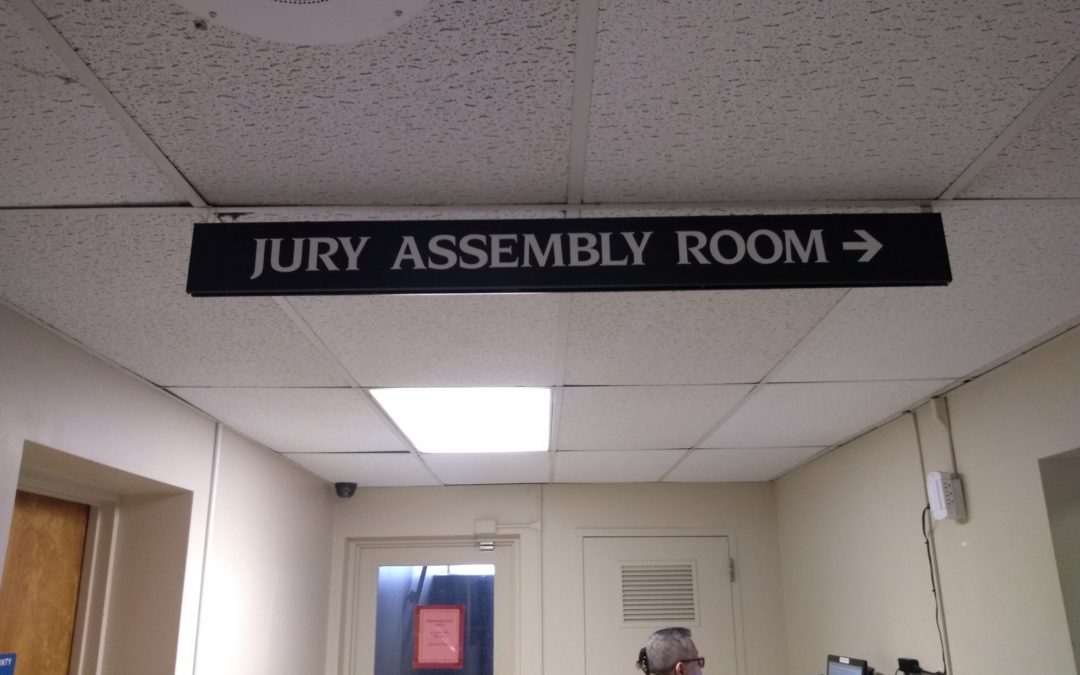If you live in California and you’re a US citizen, having to serve on a jury is a fact of life. Sooner or later, you’ll have to do it. Technically, registering to vote doesn’t increase your chance of getting called for jury duty. However, the last 2 times I’ve been called for jury duty have — by pure coincidence, I’m sure — been right after I moved to a different county and updated my voter registration.
This post is going to go over some of the applicable law in California when it comes to serving on a state jury (e.g. in Superior Court in California). The post will go over some of my own experience serving on a state jury. I have not yet served on a federal jury before so I’m not going to cover that.
Jurors in California state court do get paid for their time when they serve, but it’s a paltry $15.00 per day (see CA Code of Civil Procedure section 215(a)) and it only begins on the second day that they serve. This $15 rate hasn’t changed since 2004. In addition to the pay, jurors are also reimbursed for the miles they drive to and from the courthouse, but that’s only at 34 cents per mile starting on the second day (see CA Code of Civil Procedure section 215(c)). To compare, the IRS reimbursement rate for miles driven was 54.5 cents for 2018.
The $15 per day pay poses an obvious problem to two categories of jurors: (1) those living paycheck-to-paycheck, and (2) those who aren’t living paycheck-to-paycheck, but nonetheless still can’t afford to serve on a long trial (e.g. a week or more) and miss out on their regular pay for that amount of time.
Incidentally, I would be surprised if this is still a problem since the law on this quite settled, but I’m often surprised so here goes: If you’re an employer in California, CA Labor Code section 230(a) forbids you from discharging or in any way discriminating or penalize an employee who takes time off to serve on jury duty. The one caveat is that the employee needs to give the employer reasonable notice of upcoming jury duty, such as by alerting their employer the day after they receive their jury summons.
As an aside, I’m not going to go in to it in this post, but the remainder of CA Labor Code section 230 goes over how employers must act when their employees interact with the legal system (e.g. serve on a jury, be a witness in a case, seek relief from a domestic violence situation, etc). The goal is to have people be free enough to participate in the legal system (e.g. testify in court if they witness a crime) without having to worry about whether they will lose their job if they do so.
Additional provisions of California law on juror pay are as follows:
- If you work for a private sector employer (e.g. not the county, not the state, not the public school district, etc), California law does not require that your employer make up the difference in pay while you’re serving on a jury. Your individual employer might pay you your regular salary anyway, due to its own policies, but it is not required to do so. If your employer is nice enough to do this, just keep in mind that they might require you to turn over the $15 per day that you receive from the courts.
- In researching it quickly, it seems that most US states adhere to this rule that a private sector employee serving on a jury are not entitled to receive their normal salary. Only 9 states, plus the District of Columbia, appear to require employers to pay regular salary for at least a few days to those employees serving on a jury.
- However, if you’re in California and you do work for the government in some manner (e.g. the city, the school district, the state of California, or any other entity defined under CA Government Code section 481.200), the rule that applies to you is that you’re not entitled to the $15 per day of juror pay if your employer continues to pay you your regular salary and provide benefits. See
CA Code of Civil Procedure section 215(b) These employees would, however, continue to receive the $0.34 per day for mileage. - If you work for a public school district or community college district, there’s another rule that applies to you thanks to, respectively, CA Education Code section 44037 and CA Education Code section 87036. These code sections provide that for any employee regularly called for jury service, “The governing board shall grant such leave with pay up to the amount of the difference between the employee’s regular earnings and any amount he receives as juror’s fees.” In other words, if you qualify under either of these code sections, your employer is required to pay you the difference between your regular pay and the $15 per day juror fee that you receive.
As always, this post is not intended to be a comprehensive tome on the subject of jury service in California state courts. Most people don’t normally consult an attorney prior to being called for jury duty, but that’s not to say that you can’t do it if you truly feel you need legal counsel of some kind. Otherwise, I hope the information in this post and the links I provided are helpful.
Andy Chen
Latest posts by Andy Chen (see all)
- California and New York Civil Discovery: Response Times - April 26, 2024
- Grounds for Divorce in New York versus California - April 24, 2024
- California and New York Civil Discovery: Scope - April 22, 2024


I work at a courthouse and if I am serving jury duty, can my employer put me to work while the jurors are waiting? Me being one of them.